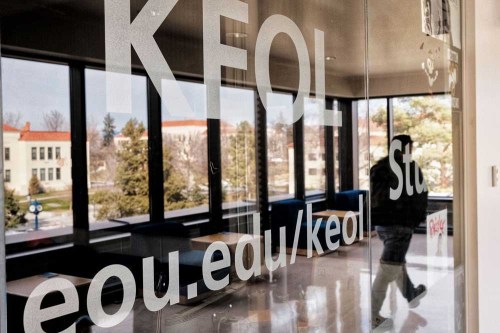Eastern Oregon University radio station may go silent
Published 9:00 am Friday, March 12, 2021

- A passerby reflects in the glass of the KEOL radio booth on Friday, March 5, 2021, at Eastern Oregon University in La Grande. The university’s Student Fee Committee has voted not to fund KEOL in 2021-22.
LA GRANDE — Eastern Oregon University’s student-run FM radio station, KEOL, may go silent after the school year.
KEOL is receiving $33,481 in 2020-21 from the university’s Student Fee Committee and asked for $33,606 for 2021-22. But the committee voted not to fund KEOL in 2021-22.
“It was a very tough decision,” said Keegan Sanchez, vice chair of the Student Fee Committee and Eastern’s student body president.
The Student Fee Committee, which voted to defund KEOL on Feb. 5, determines how much money from student incidental fees is to go to 20 student organizations and programs on campus. The student senate earlier this week approved the recommendations. They must next receive the approval of EOU President Tom Insko and EOU Board of Trustees.
Sanchez said the SFC had to trim the money it allots to student programs because declining enrollment is reducing the amount of incidental fee money. This forced the committee to cut funding for all but one of the programs and operations — referred to as units — of which the fees pay.
“Almost every unit took a hit,” said Zachary Cahill, the chair of the Student Fee Committee and the director of financial affairs for EOU’s student government.
Units that received cuts included athletics, which was trimmed $31,000 to $513,000, and the Hoke Union Building, which was cut $7,500 to $304,000. Cahill said the committee wanted to cut more from the Hoke Union Building’s budget, but could not because there are so many fixed operational costs, such as heating, plumbing and maintenance staff. The building is the home site of about 50 EOU clubs.
The SFC received requests for $1.4 million in funding for 2021-22, but could allot only $1.2 million because of the projected decline in incidental fee revenue.
A big portion of KEOL’s budget covers the cost of paying its two student employees, who will receive a combined total of about $20,000 in the 2020-21 school year, said Cahill. The station also has about four student disc jockeys, who work as volunteers.
Cahill said KEOL, based in the Hoke Union Building, was defunded in part because studies indicate radio is a fading industry with a dim future.
“Radio may be obsolete in 10 years,” he said.
It thus does not make sense for KEOL to continue operating because the students working there would not be developing skills that would help them as they pursue careers after college.
Cahill wants Eastern to develop a class or club that would help students develop disc jockey-related skills that will be in demand, such as those needed to produce a podcast.
Sanchez said it is not known how many students tune in to KEOL.
“There is no metric for tracking how many listen,” he said.
Eastern’s Student Fee Committee also made its allocations based on how many students a program attracts.
“We looked at participation rates,” Sanchez said, noting that KEOL’s is low.
The committee also initially did not approve funding for Eastern’s student newspaper, The Voice. The SFC changed gears after representatives of The Voice appealed the decision. The SFC then voted to provide the newspaper $7,500, which is $10,500 short of the amount The Voice initially requested.
Funding for The Voice was cut because of low productivity. Sanchez said that Eastern published just two editions in 2020.
“That is not sufficient,” Sanchez said.
One of the editions was a paper one and the other was online. Cahill said the paper edition could not be distributed because of COVID-19 concerns. He added The Voice‘s future editions will be published online.
KEOL’s leaders, unlike those at The Voice, did not appeal the SFC’s decision to withdraw funding. One reason may have been that KEOL’s faculty adviser, Michael Williams, died in late 2020. Williams was the director of the TRiO Student Support Services program.
The Observer tried repeatedly to get a comment about the SFC’s defunding decision from a KEOL representative, but no one returned phone calls.
KEOL’s history dates back to at least 1973 when it received its FCC license to operate, according to its website. The station was based in Eastern’s library from 1976 to 1991. It was then relocated into a small building north of the library. The station was moved into the Hoke Union Building in 2015.






